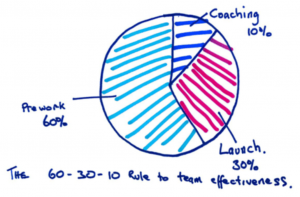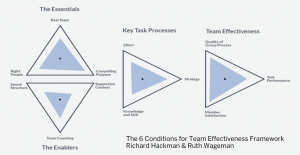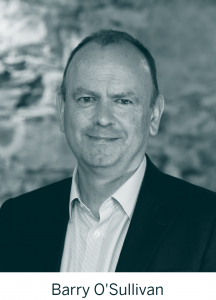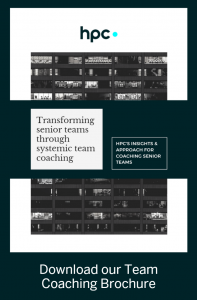HPC Executive and Team Coach, Barry O’Sullivan explores some of the factors that impact team effectiveness and how team coaching can play a role in ‘re-launching’ a team and powering its future growth and success.

After working with many teams and identifying the 6 Conditions for Team Effectiveness, Richard Hackman and Ruth Wageman of Harvard University framed the 60-30-10 rule. This simple rule of thumb became a guide to where leaders might place their time and energy to develop high performing teams.
It’s a simple idea. Place the majority, or 60% of your energy on the pre-work, where it will have most impact. Spend 30% of time and energy on building a solid foundation and spend the balance of 10% on coaching the team in real time, simply paying attention to the factors that impact team effectiveness.
But what if you already have a team in situ? What happens when a leader realises that the team is not performing at its best? What happens when stakeholders, such as the board or key clients, demand more? Sometimes teams get stuck, lose their direction and motivation. What can you do with this team?
As team coaches, we have vast experience of working with teams to enhance their performance and deliver on their organisational mandate. We partner with senior teams over an extended period, to shine a light on the factors that impact team effectiveness. Rather than just coaching one member of the team, the team becomes our client. We aim to increase the capacity of the team to coach itself.
How do we do this?
We work closely with the team to understand what’s happening in real time and how the team is functioning as a collective. While diagnostic instruments can play a role in understanding the factors impacting team effectiveness, our greatest skill is in identifying what is being said and what is not being said. By playing this back to the team, questioning and through constructive challenge, we can begin to tackle the key drivers of an effective team. Key questions such as:
– Is the team a real team? Are they a stable group of individuals capable of working with each other brilliantly?
– What’s the team’s compelling purpose? Does everyone on the team understand how critical they are to the delivery of the common purpose? What is it that the team can do better than the members can do as individuals? In our experience working with senior teams, it is this issue that surfaces most commonly as a blockage for teams.
– Have you got the right people, with the right task and teamwork skills to deliver?
– How can you establish a solid structure, the best work practices and behaviour norms to help achieve team goals? While many teams will have tools such as team charters in place, they may not observed in practice. Unhelpful behavioural norms can quickly undermine a team’s effectiveness. What happens within the senior team is observed by colleagues outside the team, leading to a further erosion of impact.
– Finally, leadership can ask if they are providing a supportive organisational context that provides the necessary resources to the team and its members.

Through team coaching, we work with the team to pay attention to what happens in real time. We actively work with the team to reduce the barriers to their effectiveness. While interventions, tools and diagnostics all play a part, the added value we provide is the real partnership we form with the team to understand itself and the conditions that impact on its success.
While you can’t “launch” an existing team, it is possible to “re-launch” a team with team coaching. In our experience, time spent bringing the team together and engaging with their purpose, process and dynamics is time well invested. It raises their capability and builds their credibility throughout the organisation. Supporting the team in the re-launch process and giving it the attention it needs is invaluable. Re-laying the foundations for effectiveness by improving the conditions in the team will pay dividends long into the future.
Barry is a member of HPC’s Executive & Team Coaching Panel. He has worked as a senior executive for over 20 years in financial services, sales management and operations to director level.
Barry has worked as a Coach since 2010. His experience includes coaching senior leadership in Financial Services, IT, Professional Services, Retail, Wealth Management and Utilities.
Through team coaching, he has enabled senior leaders and their teams to achieve a sustained step change in collective performance and growth.
HPC’s approach to team coaching is based around our core strengths in discovery, diagnosis, design and delivery. But also, our deep commitment to helping your team transform the way they think and act, which leads to a significant and sustained impact on business results.
We have researched, structured and implemented our leadership team coaching solution around a number of leading psychological schools of thought and our experiences of working directly with senior teams. While team coaching is still an emerging field in academia and L&D, our approach is already delivering pivotal results.
Download our Team Coaching Brochure for more information or get in touch with our team for a more in-depth discussion at info@wearehpc.com

